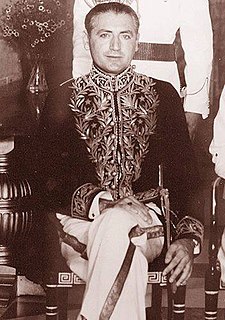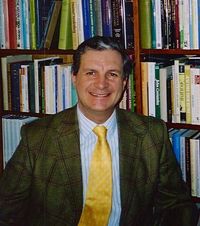The Thule Society, originally the Studiengruppe für germanisches Altertum, was a German occultist and völkisch group founded in Munich right after World War I, named after a mythical northern country in Greek legend. The society is notable chiefly as the organization that sponsored the Deutsche Arbeiterpartei, which was later reorganized by Adolf Hitler into the National Socialist German Workers' Party. According to Hitler biographer Ian Kershaw, the organization's "membership list ... reads like a Who's Who of early Nazi sympathizers and leading figures in Munich", including Rudolf Hess, Alfred Rosenberg, Hans Frank, Julius Lehmann, Gottfried Feder, Dietrich Eckart, and Karl Harrer.
Karl Maria Wiligut was an Austrian Occultist and SS-Brigadeführer.
The völkisch movement was the German interpretation of a populist movement, with a romantic focus on folklore and the "organic", i.e.: a "naturally grown community in unity", characterised by the one-body-metaphor (Volkskörper) for the entire population during a period from the late 19th century up until the Nazi era.

Western esotericism, also called esotericism, esoterism, and sometimes the Western mystery tradition, is a term under which scholars have categorised a wide range of loosely related ideas and movements which have developed within Western society. These ideas and currents are united by the fact that they are largely distinct both from orthodox Judeo-Christian religion and from Enlightenment rationalism. Esotericism has pervaded various forms of Western philosophy, religion, pseudoscience, art, literature, and music, continuing to affect intellectual ideas and popular culture.
Adam Alfred Rudolf Glauer, better known under his pseudo-aristocratic aliasRudolf Freiherr von Sebottendorff was a German occultist, writer, intelligence agent and political activist. He was the founder of the Thule Society, a post-World War I German occultist organization where he played a key role, and that influenced many members of the Nazi Party. He was a Freemason, a Sufi of the Bektashi order - after his conversion to Islam - and a practitioner of meditation, astrology, numerology, and alchemy. He also used the alias Erwin Torre.

Miguel Joaquín Diego del Carmen Serrano Fernández, better known as Miguel Serrano, was a Chilean diplomat, writer, occultist, and fascist activist. A Nazi sympathiser in the late 1930s and early 1940s, he later became a prominent figure in the neo-Nazi movement as an exponent of Esoteric Hitlerism.
Nazism and occultism describes a range of theories, speculation and research into the origins of Nazism and its possible relation to various occult traditions. Such ideas have been a part of popular culture since at least the early 1940s, and gained renewed popularity starting in the 1960s. There are documentaries and books on the topic, among the most significant are The Morning of the Magicians (1960) and The Spear of Destiny (1972). Nazism and occultism has also been featured in numerous films, novels, comic books and other fictional media. A prominent example is the film Raiders of the Lost Ark (1981).

Nicholas Goodrick-Clarke was a British historian and professor of Western Esotericism at University of Exeter, best known for his authorship of several scholarly books on esoteric traditions.

Armanism and Ariosophy are esoteric ideological systems pioneered by Guido von List and Jörg Lanz von Liebenfels respectively, in Austria between 1890 and 1930. The term 'Ariosophy', meaning wisdom concerning the Aryans, was first coined by Lanz von Liebenfels in 1915 and became the label for his doctrine in the 1920s. In research on the topic, such as Nicholas Goodrick-Clarke's book The Occult Roots of Nazism, the term 'Ariosophy' is used generically to describe the Aryan-esoteric theories of a subset of the 'Völkische Bewegung'. This broader use of the word is retrospective and was not generally current among the esotericists themselves." List actually called his doctrine 'Armanism', while Lanz used the terms 'Theozoology' and 'Ario-Christianity' before the First World War.
The Armanen-Orden was founded as a revival of the Ariosophical Guido von List Society by German occultist Adolf Schleipfer and his then-wife Sigrun von Schlichting.

Johannes Hans Balzli, more commonly known as Johannes Balzli, was an Austrian/German author, newspaper editor, Theosophist and Armanist, most notable for his biography of Guido von List, entitled, "Guido v. List: Der Wiederentdecker Uralter Arischer Weisheit - Sein Leben und sein Schaffen" .

Friedrich Wannieck was a prominent and wealthy Austrian/German industrialist most notable for his successful business ventures and his enthusiastic support for the völkisch author, pioneer of Germanic mysticism and runic revivalist, Guido von List. He is the father of Friedrich Oskar Wannieck.
Philipp Stauff (1876–1923) was a prominent German/Austrian journalist and publisher in Berlin. He was an enthusiastic Armanist, a close friend of Guido von List, and a founding member of the Guido-von-List-Society. He was also the obituarist for List in the Münchener Beobachter.
Esoteric Nazism is any of a number of mystical interpretations and adaptations of Nazism in the post–World War II period. After 1945, esoteric elements of the Third Reich were adapted into new völkisch religions of white nationalism and neo-Nazism.
This article gives an overview of esoteric movements in Germany and Austria between 1880 and 1945, presenting Theosophy, Anthroposophy and Ariosophy, among others, against the influences of earlier European esotericism.
Gregor Schwartz-Bostunitsch was a prominent figure in Nazi Germany. He was a German-Russian author in the völkisch movement and became SS-Standartenführer in 1944. His death is unclear.
Historians, political scientists and philosophers have studied Nazism with a specific focus on its religious and pseudo-religious aspects. It has been debated whether Nazism would constitute a political religion, and there has also been research on the millenarian, messianic, and occult or esoteric aspects of Nazism.
Reichshammerbund was a German anti-Semitic movement founded in 1912 by Theodor Fritsch.







